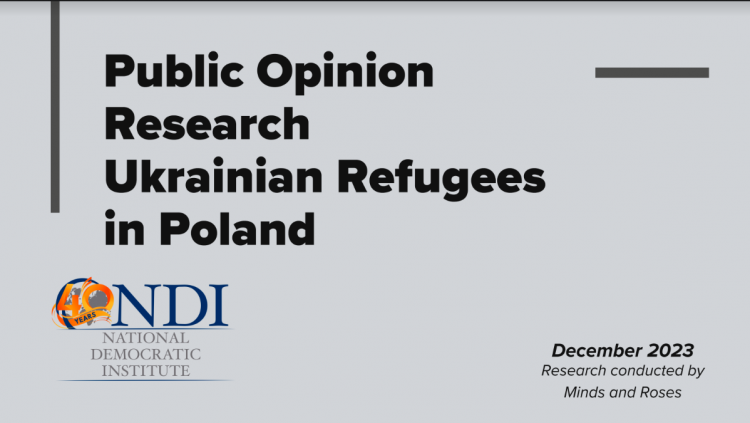Polish and Ukrainian Attitudes on the Ukrainian Community in Poland
Between May and June 2023, NDI conducted 14 qualitative focus groups, and 700 face-to-face and 700 CATI interviews with Polish and Ukrainian residents living in seven of Poland’s largest cities, which include Białystok, Katowice, Łódź, Lublin, Rzeszów, Wrocław, Kraków. The interviews and focus groups explored attitudes toward the Ukrainian refugee population in Poland, along with how Ukrainian citizens experience the cities they live in. The research engaged respondents about their experience with housing, employment, disinformation, discrimination, and use of municipal services, in addition to overall attitudes and priorities of both Polish and Ukrainian residents. NDI research found:
- Poles overall believe that cities benefit from the presence of refugees, although this perspective varies across different cities. Their residence in cities is primarily valued for economic reasons, as Ukranians often undertake less desirable work and pay taxes. However, there is also a perception of the Ukrainian community as burdens to the state, as they benefit from social programs, potentially negatively impact the job market by accepting work for lower salaries, and some have legally unreported employment. Poles widely believe refugees should benefit from public services and programs, but there are specific services that are more controversial.
- Refugees tend to share similar positive opinions about the cities in which they presently reside. This shared consensus predominately is from a sense of safety in municipalities and a welcoming and helpful attitude of Polish residents. They express overall satisfaction with healthcare benefits and current living arrangements, (primarily privately rented apartments), in addition to educational institutions and the responsiveness of government agencies. The Ukrainian community in Poland varies in their experience of employment and financial status.
- The Ukrainian community in Poland varies in their experience of employment and financial status. Some are employed, financially secure and report contentment with their status, while others are seeking employment and face financial difficulties. Over half of the refugees are employed, with employment rates varying across cities. A significant portion work in positions below their qualifications or different from their work in Ukraine. The majority are employed legally, with a small percentage working illegally with employment not officially registered.
